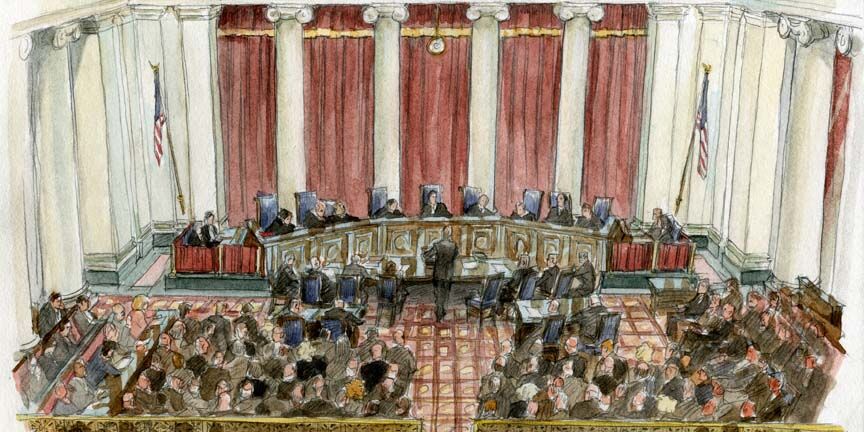Tuesday round-up

on Oct 17, 2017 at 7:21 am

Yesterday the Supreme Court added four cases to its merits docket for the current term. Amy Howe has this blog’s coverage, which first appeared at Howe on the Court. The most high-profile grant was in United States v. Microsoft Corp., which asks whether the government can gain access from email providers to data that is stored overseas. Additional coverage of the grant in Microsoft comes from Mark Sherman at the Associated Press, Greg Stohr at Bloomberg, Lawrence Hurley at Reuters, Robert Barnes for The Washington Post, Adam Liptak for The New York Times, Brent Kendall for The Wall Street Journal, and Josh Gerstein at Politico, who reports that “[l]aw enforcement officials say they need the ability to compel U.S.-based firms to comply with subpoenas and search warrants, but the companies argue that giving American investigators the right to do that will lead to foreign governments demanding data stored on U.S. soil.” In an op-ed for The Washington Post’s Volokh Conspiracy blog, Orin Kerr remarks that “it’s shaping up to be a really big Supreme Court term for digital evidence collection.”
At Bloomberg, Greg Stohr reports that the justices also agreed to review the application of antitrust law to credit-card-network anti-steering rules in Ohio v. American Express Co., noting that the court’s decision to consider reviving “government allegations that American Express Co. thwarts competition by prohibiting merchants from steering customers to cards with lower fees” “could roil the credit-card business.” Additional coverage comes from Andrew Chung at Reuters and from AnnaMaria Andriotis and Brent Kendall in The Wall Street Journal.
Yesterday’s order list also included some notable cert denials. The Associated Press reports that by denying cert in Al-Nashiri v. Trump, “[t]he Supreme Court is leaving in place a decision that the alleged mastermind of the 2000 attack on the USS Cole that killed 17 U.S. sailors should face a trial by a military commission.” Another Associated Press report notes that the court declined in City of Bloomfield v. Felix to review a lower-court decision “that ordered a New Mexico city to remove a Ten Commandments monument from the lawn outside City Hall.” At Education Week’s School Law Blog, Mark Walsh reports that the justices also “refused to revive a $4.5 million jury award under Title IX for a Texas student who was sexually abused over several years by a school administrator.” At the Florida Court Review, John Cavaliere points out that yesterday’s order list included dispositions of several Florida death-penalty cases, including cert denials in Truehill v. Florida and Oliver v. Florida.
Briefly:
- At Bloomberg, Greg Stohr reports that the court “may drop a scheduled securities-fraud clash, Leidos, Inc. v. Indiana Public Retirement System, currently scheduled for oral argument on Nov. 6, “after the two sides told the justices they are near a settlement.”
- At the Cato Institute’s Cato at Liberty blog, Ilya Shapiro and Meggan Dewitt urge the court to grant a cert petition in a regulatory-taking case, arguing that “[r]efusing compensation in cases that clearly fall under the Supreme Court’s total-deprivation-of-use rule will merely provide incentives to investors who want to avoid the risk of total loss to develop as much as possible, as quickly as possible.”
- At The World and Everything in It (podcast), Mary Reichard discusses the recent oral arguments in probable-cause and qualified-immunity case District of Columbia v. Wesby; Sessions v. Dimaya, which asks whether a criminal-removal provision of the immigration laws is unconstitutionally vague; and Jennings v. Rodriguez, a challenge to the prolonged detention of immigrants without bond hearings.
- At the Cato Institute’s Cato at Liberty blog, Andrew Grossman and others argue that the justices should grant cert in a case involving evidentiary standards for class certification, and should “protect due-process rights by clarifying that evidence submitted at the class-certification stage must meet the same time-tested standards as evidence submitted at trial.”
We rely on our readers to send us links for our round-up. If you have or know of a recent (published in the last two or three days) article, post, podcast, or op-ed relating to the Supreme Court that you’d like us to consider for inclusion in the round-up, please send it to roundup [at] scotusblog.com. Thank you!


